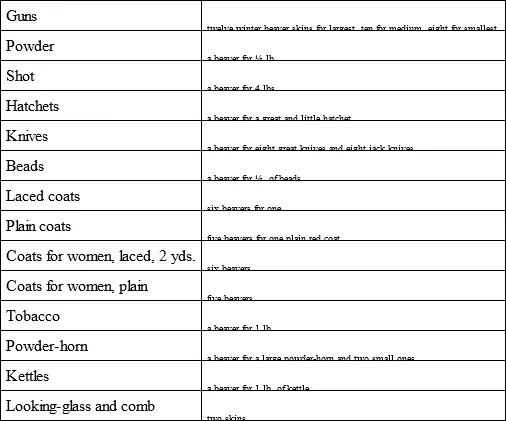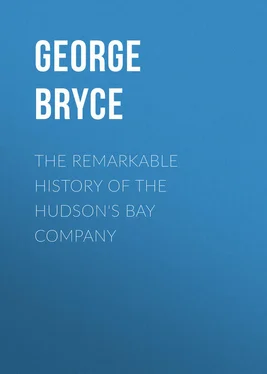George Bryce - The Remarkable History of the Hudson's Bay Company
Здесь есть возможность читать онлайн «George Bryce - The Remarkable History of the Hudson's Bay Company» — ознакомительный отрывок электронной книги совершенно бесплатно, а после прочтения отрывка купить полную версию. В некоторых случаях можно слушать аудио, скачать через торрент в формате fb2 и присутствует краткое содержание. Издательство: Иностранный паблик, Жанр: foreign_antique, foreign_prose, на английском языке. Описание произведения, (предисловие) а так же отзывы посетителей доступны на портале библиотеки ЛибКат.
- Название:The Remarkable History of the Hudson's Bay Company
- Автор:
- Издательство:Иностранный паблик
- Жанр:
- Год:неизвестен
- ISBN:нет данных
- Рейтинг книги:3 / 5. Голосов: 1
-
Избранное:Добавить в избранное
- Отзывы:
-
Ваша оценка:
- 60
- 1
- 2
- 3
- 4
- 5
The Remarkable History of the Hudson's Bay Company: краткое содержание, описание и аннотация
Предлагаем к чтению аннотацию, описание, краткое содержание или предисловие (зависит от того, что написал сам автор книги «The Remarkable History of the Hudson's Bay Company»). Если вы не нашли необходимую информацию о книге — напишите в комментариях, мы постараемся отыскать её.
The Remarkable History of the Hudson's Bay Company — читать онлайн ознакомительный отрывок
Ниже представлен текст книги, разбитый по страницам. Система сохранения места последней прочитанной страницы, позволяет с удобством читать онлайн бесплатно книгу «The Remarkable History of the Hudson's Bay Company», без необходимости каждый раз заново искать на чём Вы остановились. Поставьте закладку, и сможете в любой момент перейти на страницу, на которой закончили чтение.
Интервал:
Закладка:
The plan of management was to have a governor appointed over each fort for a term of years, and a certain number of men placed under his direction. In the first year of the Hudson's Bay Company's operations as a corporate body, Governor Charles Bailey was sent out to take charge of Charles Fort at Rupert's River. With him was associated the French adventurer, Radisson, and his nephew, Jean Baptiste Groseilliers. Bailey seems to have been an efficient officer, though fault was found with him by the Company. Ten years after the founding of the Company he died in London, and was voted a funeral by the Company, which took place by twilight to St. Paul's, Covent Garden. The widow of the Governor maintained a contention against the Company for an allowance of 400 l. , which was given after three years' dispute. Another Governor was William Lydall, as also John Bridgar, Governor of the West Main; and again Henry Sargeant, Thomas Phipps, Governor of Fort Nelson, and John Knight, Governor of Albany, took an active part in the disputes of the Company with the French. Thus, with a considerable amount of friction, the affairs of the Company were conducted on the new and inhospitable coast of Hudson Bay.
To the forts from the vast interior of North America the various tribes of Indians, especially the Crees, Chipewyans, and Eskimos, brought their furs for barter. No doubt the prices were very much in favour of the traders at first, but during the first generation of traders the competition of French traders from the south for their share of the Indian trade tended to correct injustice and give the Indians better prices for their furs.
The following is the standard fixed at this time: —

The trade conducted at the posts or factories along the shore was carried on by the local traders so soon as the rivers from the interior – the Nelson and the Churchill – were open, so that by the time the ship from London arrived, say in the end of July or beginning of August, the Indians were beginning to reach the coast. The month of August was a busy month, and by the close of it, or early in September, the ship was loaded and sent back on her journey.
By the end of October the ships arrived from Hudson Bay, and the anxiety of the Company to learn how the season's trade had succeeded was naturally very great. As soon as the vessels had arrived in the Downs or at Portsmouth, word was sent post haste to London, and the results were laid before a Committee of the Company. Much reference is made in the minutes to the difficulty of preventing the men employed in the ships from entering into illicit trade in furs. Strict orders were given to inspect the lockers for furs to prevent private trade. In due time the furs were unladen from the ships and put into the custody of the Company's secretary in the London warehouse.
The matter of selling the furs was one of very great importance. At times the Company found prices low, and deferred their sales until the outlook was more favourable. The method followed was to have an auction, and every precaution was taken to have the sales fair and aboveboard. Evidences are not wanting that at times it was difficult for the Court of Adventurers to secure this very desirable result.
The matter was not, however, one of dry routine, for the London merchants seem to have encouraged business with generous hospitality. On November 9th, 1681, the sale took place, and the following entry is found in the minutes: "A Committee was appointed to provide three dozen bottles of sack and three dozen bottles of claret, to be given to buyers at ye sale. Dinner was also bespoken at 'Ye Stillyard,' of a good dish of fish, a loyne of veal, two pullets, and four ducks."
As the years went on, the same variations in furs that we see in our day took place. New markets were then looked for and arrangements made for sending agents to Holland and finding the connections in Russia, that sales might be effected. In order to carry out the trade it was necessary to take large quantities of hemp from Holland in return for the furs sent. The employment of this article for cordage in the Navy led to the influence of important members of the Company being used with the Earl of Marlborough to secure a sale for this commodity. Pending the sales it was necessary for large sums of money to be advanced to carry on the business of the Company. This was generally accomplished by the liberality of members of the Company itself supplying the needed amounts.
The Company was, however, from time to time gratified by the declaration of handsome dividends. So far as recorded, the first dividend was declared in 1684, and judged by modern standards it was one for which a company might well wait for a number of years. It was for 50 per cent. upon stock. Accordingly, the Earl of Craven received 150 l. , Sir James Hayes 150 l. , and so on in proportion. In 1688 another dividend of a like amount of 50 per cent. on the stock resulted, and among others, Hon. Robert Boyle, Earl Churchill, and Sir Christopher Wren had their hearts gladdened. In 1689 profits to the extent of 25 per cent. on the stock were received, and one of the successful captains was, in the exuberance of feeling of the stockholders, presented with a silver flagon in recognition of his services. In 1690, however, took place by far the most remarkable event of a financial kind in the early history of the Company. The returns of that year from the Bay were so large that the Company decided to treble its stock. The reasons given for this were: —
(1) The Company has in its warehouse about the value of its original stock (10,500 l. ). (2) The factories at Fort Nelson and New Severn are increasing in trade, and this year the returns are expected to be 20,000 l. in beaver. (3) The factories are of much value. (4) Damages are expected from the French for a claim of 100,000 l.
The Company then proceeded to declare a dividend of 25 per cent., which was equivalent to 75 per cent. on their original stock.
It was a pleasing incident to the sovereign of the realm that in all these profits he was not forgotten. In the original Charter the only recompense coming to the Crown, for the royal gift, was to be the payment, when the territory was entered upon, of "two elks and two black beavers." This may have been a device for keeping up the royal claim, but at any rate 300 l . in the original stock-book stood to the credit of the sovereign. It had been the custom to send a deputation to present in person the dividends to His Majesty, and the pounds sterling were always changed to guineas.
On this occasion of the great dividend, King William III. had but lately returned from his victories in Ireland. The deputation, headed by Sir Edward Dering, was introduced to the King by the Earl of Portland, and the following address, hitherto, so far as known to the writer, unpublished, was presented along with the noble gift: —
"Your Majestie's most Loyal and Dutiful subjects beg leave to congratulate your Majestie's Happy Return here with Honor and Safety. And we do daily pray to Heaven (that Hath God wonderfully preserved your Royall Person) that in all your undertakings Your Majestie may be as victorious as Cæsar, as beloved as Titus, and (after all) have the long and glorious Reigne and Peacefull end of Augustus.
"On this happy occasion we desire also most humbly to present to your Majestie a dividend of Two Hundred and twenty-five guineas upon three hundred pounds stock in the Hudson's Bay Company, now Rightfully delivered to your Majestie. And although we have been the greatest sufferers of any Company from those common enemies of all mankind the French, yet when your Majestie's just Arms shall have given Repose to all Christendom, we also shall enjoy our share of these great Benefits and do not doubt but to appeare often with this golden fruit in our hands, under the happy influence of Your Majestie's most gracious protection over us and all our Concerns."
Читать дальшеИнтервал:
Закладка:
Похожие книги на «The Remarkable History of the Hudson's Bay Company»
Представляем Вашему вниманию похожие книги на «The Remarkable History of the Hudson's Bay Company» списком для выбора. Мы отобрали схожую по названию и смыслу литературу в надежде предоставить читателям больше вариантов отыскать новые, интересные, ещё непрочитанные произведения.
Обсуждение, отзывы о книге «The Remarkable History of the Hudson's Bay Company» и просто собственные мнения читателей. Оставьте ваши комментарии, напишите, что Вы думаете о произведении, его смысле или главных героях. Укажите что конкретно понравилось, а что нет, и почему Вы так считаете.












